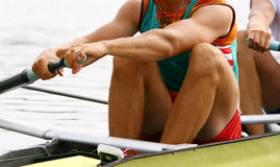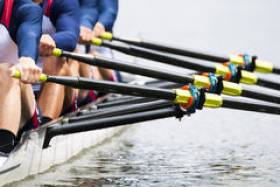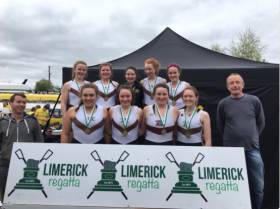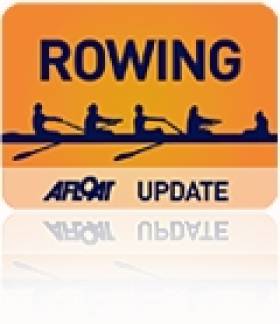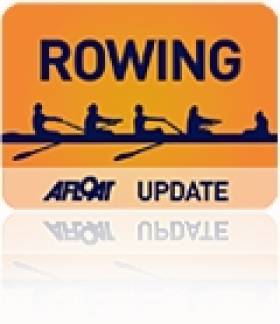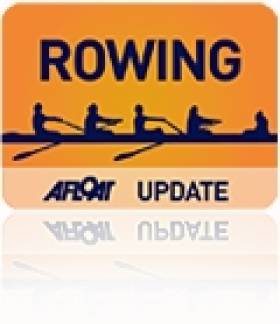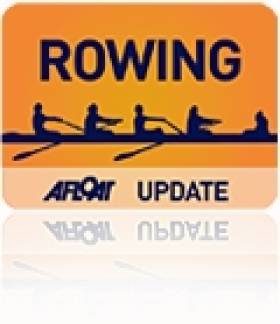Displaying items by tag: Limerick Regatta
Limerick Regatta Cancelled
#Rowing: Plans to hold Limerick Regatta on Sunday have been abandoned. The regatta was scheduled for O’Brien’s Bridge on Saturday, but the forecast predicted the arrival of Storm Hannah. The organisers have announced that a proposal to move to Sunday faltered because they could not source an ambulance and safety launch for the venue at such short notice. They thanked those who entered.
Limerick Regatta May Move Due to Weather
#Rowing: Limerick Regatta may be moved to Sunday. The weather conditions for Saturday (April 27th) at O’Brien’s Bridge could be very poor. The organisers will make an announcement later this evening.
Mannix Top Sculler at Limerick Rowing Regatta
#Rowing: Kealan Mannix won both the senior and intermediate single sculls at Limerick Regatta today. The Skibbereen man was competing for University of Limerick, who also won in the senior fours. Muckross were the top men’s club eight, while Galway won the women’s intermediate and junior eights. Castleconnell were the top men’s junior 18 eight.
Limerick Regatta, Saturday (Selected Results):
Men
Eight – Club: Muckross. Junior 18: Castleconnell. Jun 16: Col Iognaid.
Four – Sen: University of Limerick. Inter, coxed: Clonmel. Jun 18A, coxed: Castleconnell.
Pair – Sen: Portadown.
Sculling, Quadruple – Novice, coxed: Univ of Limerick. Jun 18A: CRCC.
Double – Inter: St Michael’s B.
Single – Sen: Univ of Limerick (K Mannix). Inter: University of Limerick (K Mannix). Jun 18A: St Michael’s (R Spelman).
Women
Eight – Inter: Galway. Jun 18: Galway. Jun 16: Commercial. Masters: University of Limerick.
Four – Inter, coxed: Fermoy. Jun 18: Shandon.
Pair – Jun 18: CRCC.
Sculling, Quadruple – Jun 18: Castleconnell. Jun 16, coxed: Commercial A.
Double – Inter: St Michael’s.
Single – Inter: Castleconnell (C O’Brien). Jun 18A: Castleconnell (O’Brien).
Cork Boat Club and Clonmel's Lynch Excel at Limerick
#Rowing: Cork Boat Club had a good day at Limerick Regatta at O’Brien’s Bridge today. They won the the men’s intermediate eight and senior pair and the women’s junior 18 eight. UCD won the women’s novice eight and Daire Lynch of Clonmel, who won the single sculls time trial in a very fast time (five minutes and nine seconds), went on to take the senior and intermediate singles titles.
Limerick Regatta, O’Brien’s Bridge (Selected Results)
Men
Eight – Intermediate: Cork. Club: Neptune. Jun 18: Neptune. Masters – Final One (b-c): St Michael’s A. Final Two (d-e): Athlone. Jun 16: Col Iognaid.
Four – Sen: St Michael’s. Inter, coxed: Cork. Jun 18A, coxed: St Michael’s.
Pair – Senior: Cork. Jun 18: Clonmel.
Sculling
Quad – Sen: Carlow. Nov, coxed: UCC. Jun 18A: Carlow. Jun 16, coxed: CRCC.
Double – Inter: Castleconnell B.
Single – Senior: Clonmel (D Lynch). Inter: Clonmel (D Lynch). Jun 18A: Clonmel (A Butler). Jun 16: Castleconnell (R O’Neill). Masters – Final One: Lady Elizabeth (B Smyth). Final Two: Cork (B Crean). Final Three: Galway (A McCallion).
Women
Eight – Nov: UCD. Jun 18: Cork. Jun 16: St Michael’s.
Four – Sen: Shannon. Inter, coxed: Shannon. Jun 18: Col Iognaid.
Pair – Sen: Fermoy. Jun 18: Fermoy.
Sculling
Quadruple Novice, coxed: Cappoquin. Jun 18: Cork. Jun 16, coxed: Killorglin. Masters, coxed: Univ of Limerick
Double – Inter: Carlow.
Single – Inter: Garda (B Larsen). Jun 18A: Carlow (C Nolan). Jun 16: Cork (C O’Sullivan). Masters: Offaly (C Nolan).
Skibbereen Pick Up Wins at Limerick but McKeown Sees Off Ryan
#ROWING: Skibbereen won the men’s senior four and the intermediate coxed four at Limerick regatta at O'Brien's Bridge. Sam McKeown won the senior single sculls, beating Justin Ryan of Skibbereen, who has international experience as a lightweight sculler. Damien Kelly of Garda, who had finished second to McKeown in the intermediate final, was third. Portora had a day of wins at junior level, including the men’s and women’s junior 18 eights, the men’s junior 16 eight and the men’s junior 18 coxed quad and the women’s junior four and pair.
Limerick Regatta, O’Brien’s Bridge, Selected Results:
Men
Eight – Intermediate: 1 St Joseph’s, 2 St Michael’s. Junior 18: 1 Portora, 2 St Joseph’s, 3 St Michael’s. Junior 15: 1 St Joseph’s, 2 Shandon, 3 Portora.
Junior 16: 1 Portora, 2 Col Iognáid, 3 St Joseph’s. Masters: St Michael’s.
Four – Senior: 1 Skibbereen, 2 St Michael’s. Inter, coxed: 1 Skibbereen, 2 Portora, 3 St Michael’s. Jun 18A, coxed: 1 Portora A, 2 Athlunkard, 3 St Michael’s A.
Pair – Senior: 1 St Michael’s, 2 Neptune, 3 Shannon. Junior 18: 1 Athlunkard A, 2 Athlunkard B, 3 CAI B.
Sculling – Quadruple – Club Two: 1 Cork B, 2 Shandon, 3 Cork A. Junior 18A: 1 Cork A, 2 Lee, 3 Commercial. Jun 16, coxed: 1 Lee, 2 St Michael’s C, 3 Cork A. Jun 15, coxed, Final One: 1 Shandon A, 2 St Michael’s, 3 Killorglin. Final Two: Castleconnell.
Double – Inter: 1 Skibbereen, 2 Garda, 3 St Michael’s. Jun 15: 1 St Michael’s B, 2 Lee A, 3 Workmens.
Single – Senior: 1 Portadown (S McKeown), 2 Skibbereen (J Ryan), 3 Garda (Kelly). Intermediate: 1 Portadown (S McKeown), 2 Garda (D Kelly), 3 St Michael’s (D O’Connor). Novice: 1 Castleconnell (A Mozdzer), 2 Waterford (S O’Brien), 3 Lee (H Sutton). Junior 18: 1 Athlone (P Munnelly), 2 Graiguenamanagh (A Lennon), 3 Castleconnell (N Meehan). Masters: 1 St Michael’s (S O’Donnell), 2 Lee Valley (T Corcoran), 3 Shandon (J O’Neill).
Women
Eight – Junior 18: 1 Portora, 2 St Michael’s, 3 Galway. Jun 16: 1 Shandon, 2 Commercial, 3 Portora. Jun 15: 1 Portora, 2 St Michael’s. Masters: 1 Shannon.
Four – Inter, coxed: 1 Garda, 2 Athlunkard. Junior 18: 1 Portora A, 2 Galway, 3 St Michael’s.
Pair – Junior: 1 Portora, 2 Lee, 3 St Michael’s A.
Sculling, Quadruple – Club Two: 1 Fermoy, 2 Athlunkard, 3 Sligo. Novice, coxed: 1 Fermoy, 2 Univ of Limerick, 3 Lee. Junior 18: 1 Lee, 2 Fermoy, 3 Offaly. Jun 15, coxed: 1 Cork A, 2 Fermoy A, 3 Workmens.
Double – Senior: 1 Castleconnell, 2 Sligo. Junior 15: 1 Workmens, 2 Fermoy, 3 Lee A.
Single – Inter: 1 St Michael’s (A O’Sullivan), 2 Garda (J Ryan), 3 Fermoy (S Bouanane). Novice: 1 Castleconnell (R Kilkenny), 2 Fermoy (A Collins), 3 Univ of Limerick. Jun 18A: 1 Lee (E Cummin), 2 Lee (C Maguire), 3 Fermoy (S Cotter). Jun 16: 1 Lee (C Synnott), 2 Workmens (S Burns), 3 Fermoy (A O’Sullivan).
Portora and McKeown Start Well at Limerick Regatta
#ROWING: Sam McKeown of Portadown won the intermediate single sculls, beating Damien Kelly of Garda, at Limerick Regatta today. The St Michael’s men’s senior pair came out on top and Portora won both the junior 18 and junior 16 men’s eights. Patrick Munnelly of Athlone won the final of the men’s junior 18 single sculls. The event had to be delayed for over an hour because of inclement weather and junior 14 events were cancelled. However, a meeting at the venue decided that the Irish Schools Regatta on Sunday will go ahead.
Limerick Regatta, O’Brien’s Bridge, Selected Results:
Men
Eight – Junior 18: 1 Portora, 2 St Joseph’s, 3 St Michael’s.
Junior 16: 1 Portora, 2 Col Iognáid, 3 St Joseph’s. Masters: St Michael’s.
Four – Senior: 1 Skibbereen, 2 St Michael’s.
Pair – Senior: 1 St Michael’s, 2 Neptune, 3 Shannon.
Sculling – Quadruple – Club Two: 1 Cork B, 2 Shandon, 3 Cork A. Junior 15, coxed, Final One: 1 Shandon A, 2 St Michael’s, 3 Killorglin. Final Two: Castleconnell.
Single – Intermediate: 1 Portadown (S McKeown), 2 Garda (D Kelly), 3 St Michael’s (D O’Connor). Junior 18: 1 Athlone (P Munnelly), 2 Graiguenamanagh (A Lennon), 3 Castleconnell (N Meehan).
Women
Eight – Junior 18: 1 Portora, 2 St Michael’s, 3 Galway.
Sculling, Quadruple – Junior 18: 1 Lee, 2 Fermoy, 3 Offaly.
Double – Junior 15: 1 Workmans, 2 Fermoy, 3 Lee A.
Limerick Rowing Sees Harnedy Return To Winning Ways
#ROWING: Tim Harnedy of Skibbereen claimed his first win since his return to rowing in Ireland at a wet and cool Limerick Regatta at O’Brien’s Bridge today. The 31-year-old, who took a World Championship silver medal with Ireland in 2005, put Eimantas Grigalius of Three Castles and Tiernan Oliver of Queen’s University behind him in today's racing.
Limerick Regatta, O’Brien’s Bridge (Selected Results)
Men, Eight – Junior 18: 1 St Joseph’s, 2 Col Iognaid, 3 Cork.
Junior 16: 1 Cork, 2 St Joseph’s, 3 St Michael’s. Masters: St Michael’s. Junior 15: 1 Cork, 2 St Michael’s, 3 Muckross.
Four – Senior: 1 Carlow, 2 St Michael’s. Intermediate, coxed: 1 Carlow, 2 Muckross, 3 Castleconnell. Novice, coxed: 1 Shandon A, 2 Univ of Limerick A, 3 Univ of Limerick B. Junior 18A, coxed: 1 Col Iognaid, 2 St Joseph’s, 3 St Michael’s.
Pair – Senior: 1 St Michael’s A, 2 Carlow, 3 St Michael’s B.
Sculling, Quadruple – Senior: 1 Queen’s, 2 Carlow/Three Castles, 3 Carlow. Club Two: 1 Skibbereen, 2 Carlow, 3 Clonmel. Junior 18: 1 Skibbereen, 2 Cork, 3 St Joseph’s. Junior 16, coxed: 1 Cork A, 2 Killorglin, 3 Cork C. Junior 15, coxed – A Final: Col Iognaid B. B Final: St Michael’s A.
Double – Intermediate: 1 St Michael’s A, 2 Shannon, 3 Queen’s D. Junior 15 – Final One: St Michael’s. Final Two: Lee C.
Single – Senior: 1 Skibbereen (T Harnedy), 2 Three Castles (E Grigalius), 3 Queen’s (T Oliver). Intermediate: 1 Portadown (S McKeown), 2 St Michael’s (O’Connor), 3 St Michael’s (O’Brien). Junior 18A: St Michael’s (D O’Malley). Junior 16: Graiguenamanagh (A Lennon). Masters:
Women
Eight – Junior 18: 1 Shannon, 2 St Michael’s, 3 Shandon. Junior 16: Cork. Junior 15: St Michael’s.
Four – Junior 18: 1 Muckross, 2 Shannon, 3 Shandon.
Pair: 1 Shannon/Univ of Limerick, 2 St Michael’s, 3 Muckross A.
Sculling, Quadruple – Club Two: 1 Shannon, 2 Athlunkard. Novice, coxed: 1 Clonmel, 2 St Michael’s, Athlunkard. Junior 18: 1 Cork, 2 Fermoy, 3 Portadown. Junior 16, coxed: 1 Galway, 2 Clonmel, 3 Athlone. Junior 15, coxed – A Final: Shandon A. B Final: Castleconnell.
Double – Senior: 1 St Michael’s, 2 Castleconnell, 3 Cappoquin. Junior 15 – A Final: Fermoy A. B Final: Lee A.
Single – Intermediate: 1 Cork (A Bulman), 2 Shannon (Lane), 3 Killorglin (Joy). Novice: Clonmel (O’Loughlin). Junior 18A: 1 St Michael’s (Murphy), 2 Col Iognaid (Cushen), 3 Athlone (Curley). Junior 16: 1 Portadown (Walker), 2 Col Iognaid (Coyne) 3 St Michael’s (O’Riordan).
Coakley battles it out with Lynch to win Single Sculls
With the sculling championships coming up in September, there was great interest in the Division 1 and 2 competitions at the Limerick Regatta over the weekend with Skibbereen competing well to hold their Grand League top table position.
In Division 1 of the men's race, with 20 scullers declared, Sam Lynch of St Michael's, Limerick pipped Richard Coakley of Skibbereen in the heats by 0.48 seconds . The two former lightweight internationals battled it out in the final with Coakley exacting revenge in fine style putting Lynch into third spot with Cian Pidgeon, an intermediate from Castleconnell, putting in a fine performance to clinch second place.
In the men's Division 1 4x- race Skibbereen again showed the strength of their junior squad as they beat their club seniors and St Michael's seniors into second and third spot respectively. St Michael's took the Division 1 pairs from the aspiring intermediates from Cappoquin Rowing Club.
The double sculls competition was also keenly contested with several strong Skibbereen doubles in the heats but is was their juniors, fresh back from their silver medal at the European Junior Championships, who took first ahead of their club seniors with Clonmel and St Michaels taking second and third spot.
The Division 2 men's single sculls race, with 34 boats, was made up of novice, junior B and Junior 16 scullers. After the time trials it came down to the top four in Final A which was won by Prenderville from Muckross by 13 seconds from Lee RC, followed by Skibbereen and Workman's, who dead-heated for third place.
The women's Division 1 final was taken by Gillian Hosford of Skibbereen from a young Kate O'Brien from St Michaels. In the Division 2 final Corcoran-O'Hare (Shandon) beat Marie Piggott (Bantry) by a mere 0.43 seconds in a close finish.
In the Junior 14 and 15 ranks there was a massive entry of enthusiastic young rowers with the honours spread fairly widely around the clubs of Galway, Carrick on Shannon, Cork, Carlow, and Athlone. It was good to see new club Colaiste Chairáin from Croom in County Limerick show that, with ambition and hard work, you can get a rowing programme off the ground.
While the regatta entries were mainly Munster based, clubs from all four provinces were represented, reflecting an appetite, despite the traditional holiday season, for a serious August regatta in preparation for the small boat National Championships in September.
Click this link for Irish Rowing detailsClick this link for the Latest Rowing News



























